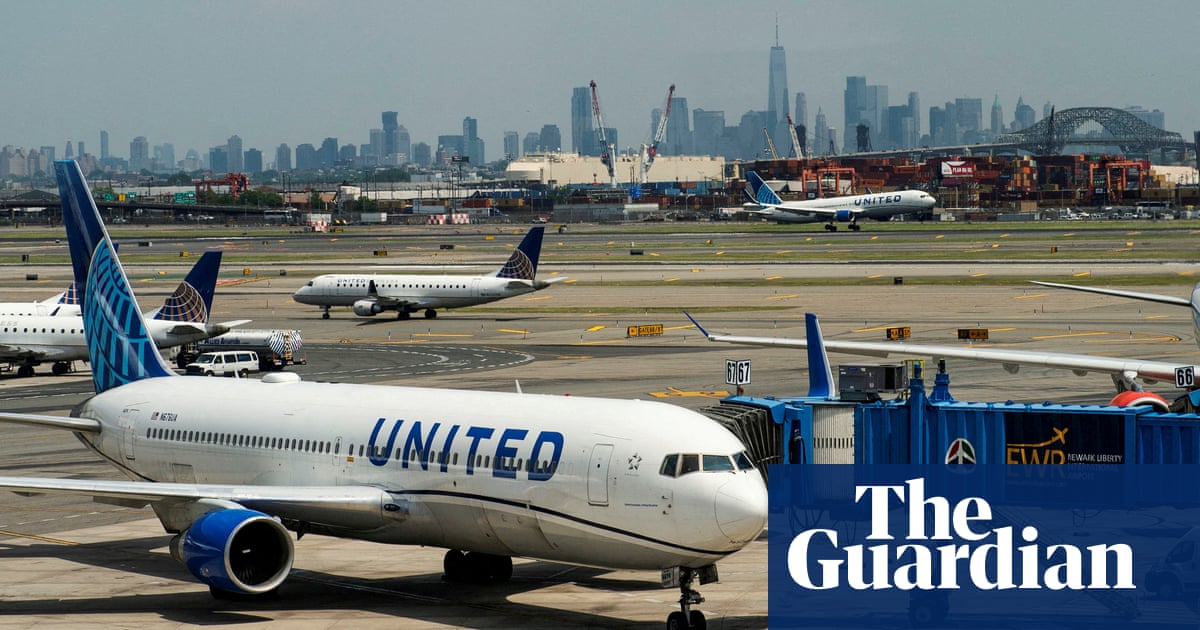Flight delays continued on Sunday as a major crisis gripped one of the US’s biggest airports amid aviation safety fears.
As of Sunday morning, there were 210 delays and 88 cancellations at Newark Liberty international airport (EWR) in New Jersey,according toFlightAware. The large airport is one of the major hubs for New York city and its surrounding area.
The weekend slowdown in operations came afterUnited Airlinesannounced on Friday that it was cancelling 35 daily roundtrip flights from Newark due to poor technology and staffing issues surrounding the Federal Aviation Administration.
In astatementon Friday, United Airlines CEO, Scott Kirby, said: “For many years, United has been very clear and vocal about the need to fix the Air Traffic Control system in EWR. While we enthusiastically support the efforts underway to permanently and structurally fix the FAA, the long-simmering FAA challenges boiled over this week.”
“In the past few days, on more than one occasion, technology that FAA air traffic controllers rely on to manage the airplanes coming in and out of Newark airport failed – resulting in dozens of diverted flights, hundreds of delayed and canceled flights and worst of all, thousands of customers with disrupted travel plans,” he said.
Kirby went on to say that technology issues at the airport were compounded after more than 20% of the FAA controllers for EWR reportedly walked off the job.
“Keep in mind, this particular air traffic control facility has been chronically understaffed for years and without these controllers, it’s now clear – and the FAA tells us – that Newark airport cannot handle the number of planes that are scheduled to operate there in the weeks and months ahead,” he added.
Explaining the cuts which come at an “already reduced schedule at Newark”, Kirby said the airline had no choice but to cancel the flights as there is “no way to resolve the near-term structural FAA staffing issues”.
He also said that United Airlines has been urging the government for years to limit the number of flights “to what the airport can realistically handle”.
Meanwhile, speaking to MSNBC correspondent Tom Costello, an air traffic controller said that it is not safe to fly out of Newark. “He said, ‘It is not safe. It is not a safe situation right now for the flying public,’” Costellotold the Daily Beast, adding: “He just said that to me, and separately: ‘Don’t fly into Newark. Avoid Newark at all costs.’”
According to the FAA, the delays are caused by a shortage of air traffic controllers. As Donald Trump’s administration continues its mass federal firingsincluding FAA safety workersdespite a slew ofdeadly crashessince inauguration day, transportation secretary Sean Duffy is urging more people to become air traffic controllers.
On Thursday, Duffy said at a press conference that the transportation department is seeking to increase employment at the FAA, aiming to hire at least 2,000 controllers this year.
Sign up toHeadlines US
Get the most important US headlines and highlights emailed direct to you every morning
after newsletter promotion
“We’re hoping in three to four years we can get to full staffing, not 20 years,” Duffysaid, adding: “How do you make up the gap? We can’t snap our fingers to make up the numbers.”
The transportation department isofferinga slew of incentives, including a 30% salary increase for new hires as well as a $5,000 bonus upon completion of the flight academy. The department is also offering a $10,000 award for academy graduates who are assigned to one of 13 hard-to-staff air traffic facilities.
The new campaign to hire more air traffic controllers comes just months after the US presidentbaselessly claimedthat Democrats and diversity, equity and inclusion (DEI) policies were responsible for falling aviation standards and the fatalWashington DC plane crashin January that killed 67 people.
Following a string of deadly flight accidents, a February pollrevealedthat Americans’ confidence in aviation has slipped, with 64% of Americans said they believe air travel is very or somewhat safe – a decrease from 71% of Americans who indicated so last year.
